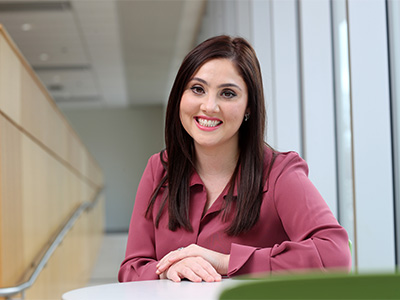Health Promotion student a passionate advocate for research and community impact

Growing up, Nicole Doria was dedicated to dancing, competing in everything from tap and jazz to lyrical and ballet. While she left the world of competitive dance behind after high school, she found it calling her back a few years later — only, this time, with a notepad in her hand rather than dance shoes on her feet.
Nicole had seen up close just how much pressure dance could put on young women. So as an undergrad in Health Promotion at Dal, she decided to explore an issue far too common in the sport: eating disorders.
“It was a vulnerable environment to grow up in as a young female," says Nicole, who now as a master’s student at Dal has continued her research into the subject. “I feel like if there was some type of education or resources or tools for dancers or parents or coaches, it could make a big difference in young girls being able to advocate and control and improve their health and body image.”
Nicole’s passion for health promotion began when she was volunteering at Sick Kids in Toronto the year after she’d completed her first undergraduate degree (in Political Science) at the University of Guelph. Looking for something to be inspired by, she found it in the connections she made with patients at the hospital.
Nicole, originally from Pickering, Ont., continues to thrive on such connections today in her fifth year as part of the Dal and Halifax communities. She spent two years working at Ronald McDonald House, supporting sick children and their families visiting hospitals in Halifax. She’s also volunteered with many community organizations including the Avalon Sexual Assault Centre, Abilities in Motion (a Halifax-based program that assists people with mobility concerns in being active) and Phoenix Youth (at-risk and homeless youth), among others.
It’s challenging work that brings her face-to-face with vulnerable populations on a daily basis.
“People put their trust in you and have a conversation with you,” she says. “I feel like just developing those relationships with people and providing resources that wouldn’t be able to be provided without volunteers is important. It may feel like little small things, but I do feel like it makes a big difference.”
Nicole has been involved in a number of research groups during her time at Dal, including the Healthy Populations Institute and the Indigenous Health Interest Group. She now serves as co-president of the latter, an interdisciplinary collective that aims to reduce Indigenous health inequities and improve Indigenous curriculum development and education, in part through engaging those populations in the research. She’ll be putting that approach to work soon outside of Dal when she starts a new job at the Maritime SPOR (Strategy for Patient-Oriented Research) Support Network.
“What I think is important is involving patients in the research,” she says. “Making sure that the research that’s done has an impact on the patients and the people who the research is intended to impact.”
Learn more
Recent News
- Bridging continents: Dal students to learn, share and connect in West Africa
- Partnership between UpLift and Public Health sees continued funding allocated for Youth Engagement Coordinators
- Dal Health grad students use podcasting to discover the people behind the science
- Nursing student closer to living out her dream of helping people thanks to support of new award
- Master of Nursing grad passionate about working in mental health and addictions
- MSc Audiology grad shifts career from entomologist to audiologist
- Occupational Science grad exploring concept of care farming
- Dal Crossroads continues 20 year legacy of student ‑led learning
